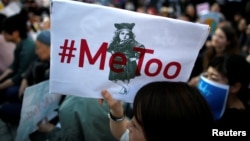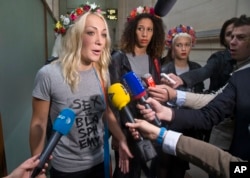Women have to be "visible and loud" in their fight for equality to build on the gains of the #MeToo movement, activists said as they push for legal reform, an end to violence and equal pay.
From India's female vigilantes who beat men accused of rape, to demonstrators in Argentina demanding safe abortions, women have been speaking out on local issues that matter to them, said Inna Shevchenko, famous for her topless feminist protests.
"The only way to change the situation is to be visible and loud," said Shevchenko, who was granted asylum in France after receiving threats in 2012 for hacking down a cross in protest against the prosecution of Russian punk band, Pussy Riot.
"All these voices and campaigns have brought us to #MeToo. It is a key movement in the history of feminist movements and it will keep spreading," she told Reuters on the sidelines of the annual Trust Conference in London.
The #MeToo movement that began in the United States a year ago, in response to accusations of sexual assault and harassment in the entertainment industry, has emboldened women to speak out, from Britain and France to India and Iran.
Tens of thousands of women have taken to social media to recount their experiences of being verbally abused, groped, molested and raped by bosses, teachers and family.
While women have been protesting over physical and sexual abuse for years, society has become more willing to listen since the emergence of #MeToo, campaigners say.
"You had to hear a Hollywood star speaking about an issue to pay attention to an issue that affects lives of so many women," said Shevchenko, a Ukrainian who leads Femen, a Paris-based group of feminists.
Members of Femen, which started in Ukraine in 2008, have protested bare-breasted and painted with slogans in front of U.S. President Donald Trump and Pope Francis, and at comedian Bill Cosby's sexual assault trial.
The next frontier, activists said, is legal reform.
'Accessible, affordable and efficient'
#MeToo led to the Times Up movement in the United States, which has raised $30 million in a defense fund to enable victims of sexual harassment to go to court, said Carol Robles-Roman, head of the ERA Coalition and the Fund for Women's Equality.
"What's next after #MeToo in the United States is constitutional equality," said Robles-Roman, a lawyer campaigning for the U.S. Constitution to be amended to expressly prohibit discrimination on the basis of sex.
"You can raise money to hire all the lawyers you want, but all it means is that the line to the courthouse is going to be that much longer with aggrieved women."
Anjuli Pandit, who said she was harassed by her company's chief executive in India but could not afford to take him to court, also called for legal reform.
"It needs to be accessible, affordable and efficient for a woman to access the law," she told the annual Trust Conference in London.
"Because it's difficult to use formal systems, and because its culturally taboo, many women in India don't get up and tell their story," she said.
'Speak up'
In India, a law which allows someone who is accused of a crime to file a criminal defamation case against the victim for speaking out is used to intimidate women, she said.
Natalie Ponce De Leon, who underwent multiple corrective surgeries after a stalker hurled acid at her in 2014, also called for women to tell their stories to bring about change.
"Girls need to speak up. I understand that they feel scared but if they continue to be silent, then the violence will continue," said Ponce, who has become a leading voice seeking stricter punishment for acid crimes in Colombia.






